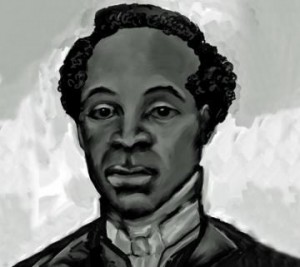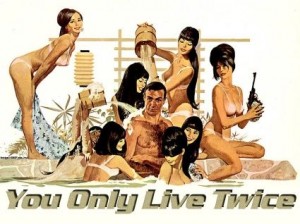OK, I don’t know what you are thinking about that title. I may not want to know. Just bear with me for a moment.
I’m returning to a little series I have going that pits James Bond against Samuel Sharpe. I have raised the question of which person we should be more interested in. Today’s category: objectification, which is to treat human beings as objects.
As a slave in Jamaica, Samuel Sharpe was, at some level, regarded as an object. The movers and shakers of transatlantic slavery bought and sold human beings like they were houses, deeded human beings to descendants in their wills like they were furniture, and regarded the costs of human beings in their financial calculations in the same way they figured the value of their agricultural machinery. These are not pleasant or appealing dimensions of the human story to dwell on.

Contrary to the logic of 19th century slavery, Samuel Sharpe was a person, not an object for economic production.
I do find it interesting, however, to consider Samuel Sharpe’s response to this dehumanization. Just how did he come to the conclusion that the slaves had natural equality with others, especially when this was not an idea that had occurred to slaves in countless cultures down through the centuries? Why did he instruct his followers to burn houses but not to harm slaveowners, when he obviously had been treated like property himself and it would have been so easy to gain revenge by treating slaveowners like property? I am thinking the grace of God must have been at work there, but just how did it seep its way into his being? I find those questions interesting and I wish we had more historical documentation to unpack the story of Sharpe’s life.
We have plenty of stories about James Bond, of course. In the Bond films, there are human beings who are always, at some level, regarded as objects. These human beings are the women. James Bond is always on the hunt for beautiful women to seduce. After these flings, we don’t ever see these women again, though James Bond keeps reappearing in every movie. It’s part of the Bond formula.
Most evangelical and traditional Christians probably respond to this point by thinking, “of course this is a problem. Sex should be reserved for marriage.” But the discussion should not end there.
The fact that James Bond tends to regard women as objects is nothing new, historically. One does not have to dig very deeply in history to find men in all sorts of cultures and civilizations who treat women in this way.
There is something new in the way that Bond objectifies women. It is the same characteristic that is found in Hugh Hefner’s Playboy philosophy: the role of consumerism. I’m not just talking about the fact that audiences have bought Bond films and Playboy magazines. I think that consumer dynamics enable James Bond films to present a sanitized Playboy philosophy for popular audiences. It’s hard to recognize because all of us in western culture are deeply shaped by consumerism and because Christians tend to evaluate movies by a simplistic rating system that doesn’t encourage more thoughtful reflection.

Contrary to the logic of late 20th century Bond films, women are persons, not objects of economic consumption.
James Bond and Playboy both emerged in the 1950s and early 1960s when a consumer-driven lifestyle came within reach of most Americans (and a few Brits, if they could afford it). And Americans enthusiastically embraced this consumer world. Hefner and the Bond films took advantage of a certain kind of consumer lifestyle (among other things) to attract audiences. Consider the lifestyle that each glorified. Early on, Hugh Hefner cultivated an idealized image of the playboy as a man living in a “pad” (not a home), furnished with cool furniture, hi-fi stereos and tasteful décor. He wore snappy suits and drank martinis. Children did not inhabit this world (we should be thankful for that). Nor did married, old, or physically unattractive women. This lifestyle setting helped Hefner in his efforts to make pornography respectable and even cool.
If you cover up the women a bit more, this cool form of consumerism also defined James Bond’s lifestyle. (And it’s not just in the films. Today you can purchase James Bond items online and imagine yourself to be living his lifestyle. Good luck with that dream.)
Both Hugh Hefner and James Bond treated women as objects designed for their sexual gratification. Like sports cars, women were quickly disposed of once a more fascinating model came along. Like “hip” furniture, women were valued primarily for their physical, external appearance. Just as we are to believe that the purchasing, wearing and disposing of stylish clothes does not bring any problematic consequences to our relationships, so we are to believe that the seduction and disposal of beautiful women does not bring any problematic consequences to our relationships. Slaveowners viewed slaves like machinery, as cogs in their system of economic production. Hefner and Bond viewed women like luxury cruises, as items in their lifestyles of economic consumption.
Of course, Bond films haven’t been the only ways that a sanitized Playboy philosophy has expressed itself in our culture. But they have been widely popular. As such, Bond films have played a role in the tendency that has developed during the last half century to look upon sexuality as a component of our consumer lifestyle. There’s a different kind of slavery at work here.
It’s a historical development that requires better understanding. As such, I think it is quite good, when viewing films, to think about and discuss these issues. This kind of film viewing is not only interesting, it could lead to deeper understanding, wisdom and Christian maturity.
Most people do not view films these ways, though. I’m guessing that most men who watch Bond films merely respond to the women on screen with a desire that says, on some conscious or unconscious level, “I’d like to have that.”
There it is. Slavery, sex, and consumerism.
Score
James Bond 2
Samuel Sharpe 4
